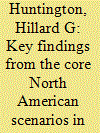|
|
|
Sort Order |
|
|
|
Items / Page
|
|
|
|
|
|
|
| Srl | Item |
| 1 |
ID:
162942


|
|
|
|
|
| Summary/Abstract |
Ambitious decarbonization targets, technology-specific policies, and computational developments led to increases in the complexity and diversity of energy system models. The lack of transparency and standardization, however, renders the assessment of model suitability for specific policy questions difficult. Therefore, this paper systematically assesses the ability of energy system models to answer major energy policy questions. It examines the existing literature on model comparison schemes, then proposes a set of criteria to compare a sample of 40 models. Besides, a novel, model-oriented approach is developed in order to cluster energy policy questions. Finally, the model capabilities and the policy questions are brought together by quantifying the gap between models and policy questions. The results show that some models are very well able to answer a wide range of energy policy questions, whereas others are only suitable for a specific area of energy policy. The representation of the distribution grid, the endogenous adjustment of demand, and the technical flexibility of the energy system are among the features, where models generally lag behind. Our results provide policy-makers with guidance on crucial model features with respect to a selection of energy policy questions and suggest potential funding priorities for future energy system modeling.
|
|
|
|
|
|
|
|
|
|
|
|
|
|
|
|
| 2 |
ID:
176860


|
|
|
|
|
| Summary/Abstract |
Within Canada, Mexico or the United States, policy-making organizations are evaluating energy markets and energy trade within their own borders often by ignoring how these countries’ energy systems are integrated with each other. These analytical gaps provided the main motivation for the Energy Modeling Forum (EMF) 34 study on North American energy integration and trade. This paper compares North American results from 17 models and discusses their policy motivation. Oil and natural gas production in the three major countries are modestly sensitive to crude oil and natural gas price changes, although these elasticities are below unity. Carbon taxes displace coal and some natural gas with renewables within all three power markets. Lower natural gas prices replace coal and some renewables with natural gas within electric generation. Higher intermittent renewable penetration in the power sector displaces coal and some natural gas. A key conclusion is that much remains to be done in integrating future analyses and in sharing and improving the quality and consistency of the underlying data.
|
|
|
|
|
|
|
|
|
|
|
|
|
|
|
|
| 3 |
ID:
179676


|
|
|
|
|
| Summary/Abstract |
Model evaluation is best considered as a process for communicating with the policymaking or policy-advising community. Six decades of energy modelling have witnessed increasing complexity in these systems, a situation that raises a number of important challenges in using them effectively in policymaking organizations. When used as a learning rather than forecasting tool, these systems can be evaluated individually one by one or through joint efforts to compare them in multi-model exercises. After summarizing the evolution of energy modelling and efforts to evaluate them since the first oil embargo, this essay provides a guide to future evaluation collaborations by highlighting a few challenges that would improve the value of these studies for the policymaking community. These challenges range broadly and cover topics such as enhancing the engagement of the model user, ventilating the models’ complexity with intuitive insights, using simple models to demonstrate key parameters or responses, applying judicious occasional meta-analysis when there is value added, reporting model responses and calibrating them for decisionmakers, considering retrospective evaluation for a past period (when possible), selecting standardized or modeler-choice baseline conditions, selectively developing policy or diagnostic alternative cases, and institutionalising the model evaluation process for a specific topic or region.
|
|
|
|
|
|
|
|
|
|
|
|
|
|
|
|
|
|
|
|
|